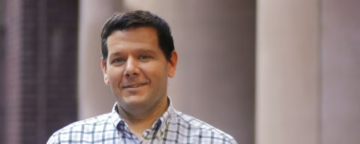In 2015, The Annenberg Foundation Trust at Sunnylands, the Annenberg Public Policy Center, and the National Academy of Sciences (NAS) began working together to fulfill Sunnylands’ mission to host “meetings of leaders and specialists in the major medical and scientific associations and institutions for the purpose of promoting and facilitating the exchange of ideas … to make advancements … for the common good and the public interest.”
Since 2015, these partner organizations, joined by the National Academies of Sciences, Engineering, and Medicine (NASEM), have convened more than a dozen Sunnylands retreats. At these convenings, leaders in science, academia, business, medical ethics, the judiciary and the bar, government, and scientific publishing explored ways to increase the integrity of science; articulate the ethical principles that should guide scientific practice to ensure that science works at the frontiers of human knowledge in an ethical way; and protect the courts from inadvertent as well as deliberate misstatements about scientific knowledge.
Protecting the Integrity of Science
On Ensuring the Integrity of Science (February 2015)
Convened in February 2015 by National Academy of Sciences President Ralph Cicerone, then-Sunnylands President Geoff Cowan, and Sunnylands program director and APPC director Kathleen Hall Jamieson, the inaugural NAS-Sunnylands-APPC retreat brought together more than a dozen scientists at the Sunnylands estate in Rancho Mirage, Calif., to examine science’s response to the kinds of issues raised by the October 18, 2013, article in the Economist titled, “Unreliable research: Trouble at the Lab – Scientists like to think of science as self-correcting. To an alarming degree, it is not.”
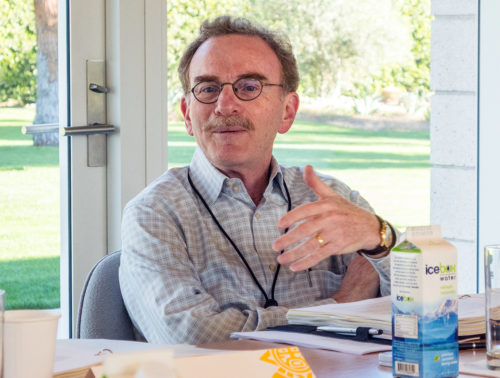
The attendees included Nobel laureate Randy Schekman, professor of molecular and cell biology at the University of California, Berkeley; Bruce Alberts, former editor-in-chief of Science and a professor emeritus at the University of California, San Francisco; Robert Nerem, founding director of the Petit Institute for Bioengineering and Bioscience at Georgia Tech; and geophysicist Maria Zuber, the vice president for research at the Massachusetts Institute of Technology. The call to action that emerged from that retreat was published in the June 2015 issue of Science under the title “Self-correction in science at work.”
In his final address to the 152nd annual meeting of the National Academy of Sciences in 2015, Cicerone acknowledged the importance of that retreat. So, too, did his successor, Marcia McNutt, who attended that first Sunnylands convening in her role as the editor of Science. In her inaugural 2017 presidential address, McNutt featured two of the recommendations developed at that Sunnylands retreat:
[O]ur guidance for revising our conflict-of-interest policies has its origins from a 2015 gathering at the Annenberg Retreat at Sunnylands organized by Ralph Cicerone where a small group of Academy members discussed how to bolster incentives to the highest standards of scientific integrity, and maintain the historically high trust of the public in the scientific profession. Following on the recommendations of that retreat, which were published in Science, we can begin by using more neutral language. The term “conflict of interest” implies that all relationships are necessarily corruptive. We suggest replacing it with “disclosure of relevant relationships” to encourage more complete disclosure from all parties.
CEOs and Leaders for Science (February 2016)
The partnership spawned a second Sunnylands retreat that was held in February 2016 on explaining the importance of basic research. Convened by Cowan and Jamieson as well as Robert Bradway, CEO of Amgen, and Subra Suresh, president of Carnegie Mellon University and a former director of the National Science Foundation, this retreat was attended by CEOs and business leaders, including Wanda Austin, president and CEO of Aerospace Corp.; Chevron CEO John Watson; TIAA president and CEO Roger Ferguson; and Charlie Munger, vice chairman of Berkshire Hathaway.
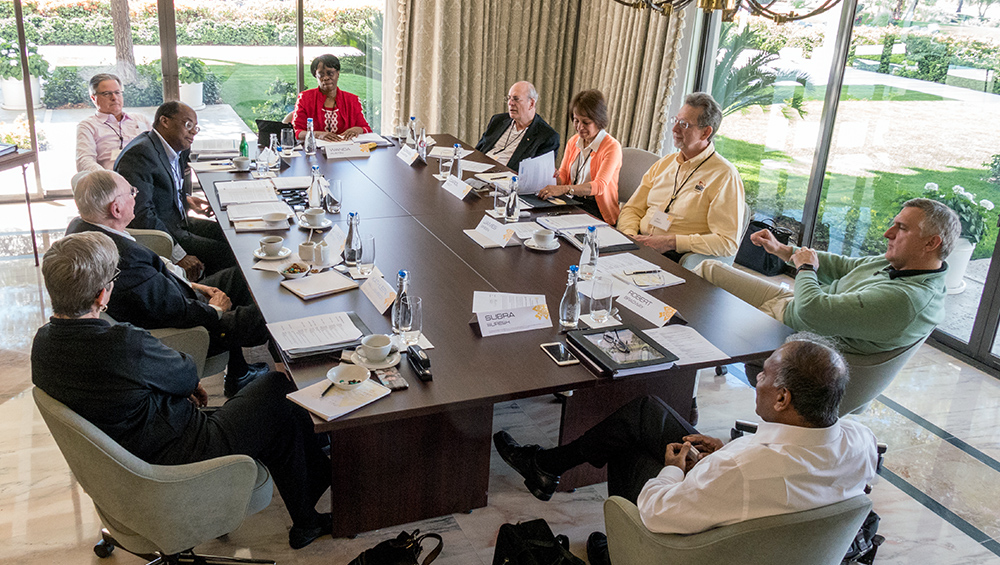
Among the products of the retreat were full-page Wall Street Journal and the New York Times ads in September 2016 signed by more than three dozen CEOs and business leaders endorsing the conclusion that basic scientific research is an investment in our prosperity, security, and well-being. Were it not for basic research, the message noted, the world would be without such life-altering technologies as the internet and smart phones, the hepatitis B vaccine and magnetic resonance imaging (MRI), smartphones and the Global Positioning System (GPS), solar panels and microprocessors.
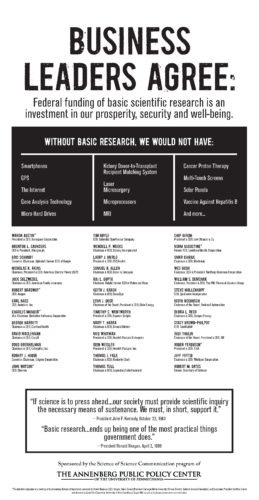 “[B]usiness leaders assembled at Sunnylands resolved to use their individual and collective credibility, and their stature as heads of enterprises that fuel the economy, to advocate for greater government support for basic scientific research to revitalize the science ecosystem,” noted Suresh and Bradway in an editorial in Science (“Business Back to Basics”). Basic research “will make or break corporations in the long term,” they declared. The retreat also resulted in distribution of a white paper on the importance of basic research both to members of congressional committees and by college and university presidents to their respective communities.
“[B]usiness leaders assembled at Sunnylands resolved to use their individual and collective credibility, and their stature as heads of enterprises that fuel the economy, to advocate for greater government support for basic scientific research to revitalize the science ecosystem,” noted Suresh and Bradway in an editorial in Science (“Business Back to Basics”). Basic research “will make or break corporations in the long term,” they declared. The retreat also resulted in distribution of a white paper on the importance of basic research both to members of congressional committees and by college and university presidents to their respective communities.
Authorship of Journal Articles in the Sciences (February 2017)
Held in February 2017, in the next follow-up to the inaugural retreat, a group of the nation’s leading scientists, scholars, and editors of science journals explored ways to ensure the integrity of science authorship. To disseminate the recommendations of that convening to the scholarly community, in March 2018 the participants published a white paper on “Transparency in authors’ contributions and responsibilities to promote integrity in scientific publication” in the Proceedings of the National Academy of Science (PNAS).
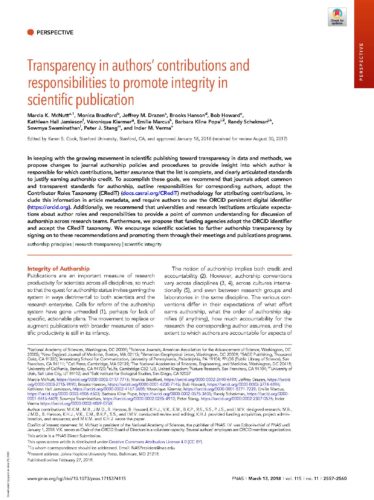 Among the authors and attendees at the NAS-Sunnylands-APPC retreat were Marcia K. McNutt, president of the National Academy of Sciences; Monica Bradford, executive editor of Science; Jeffrey Drazen, editor-in-chief of the New England Journal of Medicine; Emilie Marcus, editor-in-chief of Cell Press; Véronique Kiermer, chief scientific officer at Public Library of Science (PLOS).
Among the authors and attendees at the NAS-Sunnylands-APPC retreat were Marcia K. McNutt, president of the National Academy of Sciences; Monica Bradford, executive editor of Science; Jeffrey Drazen, editor-in-chief of the New England Journal of Medicine; Emilie Marcus, editor-in-chief of Cell Press; Véronique Kiermer, chief scientific officer at Public Library of Science (PLOS).
In their PNAS Perspective piece, published in March 2018, the group issued a call for common standards and transparency in author contributions and responsibilities, and urged journals and research institutions to clarify the role each author plays in a study or article. The promulgated standards were designed to prevent authors from “gaming the system,” and to discourage a raft of detrimental practices such as ghost, gift, honorary, and forged authorship that can harm scientific integrity. Journals across the sciences have implemented the principles articulated in the white paper.
As a result of this retreat, the National Academy of Sciences created a TACS (Transparency in Author Contributions in Science) web page “to list the journals that commit to setting authorship standards, defining responsibilities for corresponding authors, requiring ORCID IDs, and adopting the CRediT taxonomy.”
Increasing the Impact of the NAS: Consensus Reports for the 21st Century (February 2018)
To increase the responsiveness of NAS reports to the needs of Congress, the federal government and the nation, earlier that year, in February 2018, an NAS-Sunnylands-APPC retreat examined ways to maximize the value and impact of consensus reports prepared by the National Academy of Sciences for Congress and the executive branch. Participants included former executive branch employees who had commissioned and used such reports. The discussion and resulting white paper provided input to the NRC internal-processes transformation.
Exploring the Feasibility of an Advisory Board for Research Integrity: Has the Time Come? (November 2019)
Public trust in science has been challenged in recent years by highly publicized cases of research misconduct, irreproducible research, and instances in which conflicts of interest infected findings. While public confidence in science remains high, ensuring the excellence, integrity and trustworthiness of the scientific enterprise remains critical. To address these concerns, a November 2019 Sunnylands retreat drew together scientists, science publishers, and NGO leaders to explore the feasibility of creating a strategic council at the National Academy of Sciences to elevate the excellence and safeguard the health and welfare of scientific research. The retreat produced recommendations to help inform the plans of NAS President Marcia K. McNutt to create such an entity. In July 2021, the National Academy of Sciences announced the creation of a Strategic Council for Research Excellence, Integrity, and Trust, bringing together researchers, institutions, and policy makers to “identify challenges to the integrity and health of the research enterprise” and work to develop policies and best practices for resolving those challenges. APPC Director Kathleen Hall Jamieson was named among the council members.
In an October 2021 article published in the Proceedings of the National Academies of Sciences (PNAS) of the United States, McNutt credited the Sunnylands retreat with its role in the council’s formation:
Several reports from the National Academies of Sciences, Engineering, and Medicine (NASEM) have noted the lack of any organization charged with strengthening capacity to support research excellence across all domains … A group of stakeholders across all facets of the research enterprise convened for a retreat at the Annenberg Retreat at Sunnylands and recommended that the National Academy of Sciences (NAS) should step up to this mandate and engage the National Academy of Engineering (NAE) and National Academy of Medicine (NAM) in partnership. This recommendation furthermore aligns with two of the objectives in the Strategic Plan of the NAS: “Promote excellence and diversity in the scientific workforce” and “Support the basic research enterprise across all disciplines.” Further conversations within the Academies resulted in the Committee on Science, Engineering, and Medicine for Public Policy (COSEMPUP) agreeing to be the parent body for a “Strategic Council for Research Excellence, Integrity, and Trust.”
The Importance of Nomenclature (March 2021)
Because of its congressional charter and its long-lived role as the nation’s voice of and for science, the National Academies of Sciences, Engineering, and Medicine (NASEM) can play a unique role in shaping the language used publicly to discuss science, its norms, and its practices. In this virtual retreat, more than a dozen scholars and science reporters discussed ways to ensure that the language in which science is expressed is consistent, well-defined, accurately conveys the underlying science and, when they are part of the intended audience, makes sense to the press and public.
The Integrity of Survey-Based Social Science Research (November 2021)
Leading social scientists, statisticians, and survey researchers gathered with members of the NAS to discuss ways to improve and protect the accuracy of survey research. Among those taking part were current and past editors of major academic journals, past presidents of the American Political Science
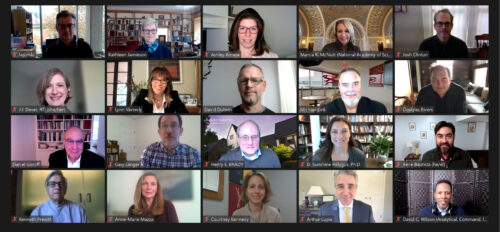
Association and AAPOR, past and incoming directors of the U.S. Census, scholars who have led some of the nation’s largest university-based election surveys, and individuals responsible for the creation and maintenance of large governmental and 501(c)3) survey data sets. The retreatants examined such questions as: What is known about the type of individuals who are over- and under-represented in surveys and how can surveys be made more representative of Americans? How can the weighting of surveys be improved? What effect does participation in multiple surveys or waves of a survey have on participants’ responses? And how can survey accuracy and transparency be improved?
A white paper of recommendations emerging from this retreat was published in the journal PNAS Nexus in late March 2023 as “Protecting the integrity of survey research.”
Communicating the Ways in Which Scientists Assess the Strength of Evidence (April 2022)
This virtual retreat of science journalists and scholars from across the social and natural sciences sought to identify the ways in which each area of science establishes that its methods and results are trustworthy; identify the strengths and weaknesses of the various approaches; and ask how the scientific community can better communicate in a variety of arenas its ways of assessing the strength of the evidence in supporting its findings. The sessions included experts in nutritional science, social science, cyber and computational sciences, conservation biology and climate, biomedicine/immunology, and astronomy/physics. Development of a short training course for journalists was among the recommendations discussed by the group.
The Future of U.S. Science Workforce Training (April 2023)
After five virtual retreats with the National Academy of Sciences, Sunnylands and the Annenberg Public Policy Center convened, in person, in Santa Monica, Calif., from March 30-April 1, 2023, for a retreat on the future of U.S. science workforce training. The purpose of the retreat was to explore alternative models to Science, Technology, Engineering, and Math (STEM) workforce preparation. Growth in the U.S. economy and the implementation of solutions to address public health, climate change, and sustainable use of resources depend on the availability of a skilled U.S. workforce. Conflicting data suggest that we are either training too few or too many U.S. workers for related STEM careers of the future.
A Framework for Addressing Artificial Intelligence in Society (February 2024)
The Sunnylands Trust, in partnership with the National Academy of Sciences (NAS) and APPC, convened an in-person retreat on February 8-10, 2024, about ways for the scientific community to respond to the perils and promises of artificial intelligence (AI). Building on a virtual retreat on November 29-30, 2023, and on a half-dozen papers commissioned by APPC, the 30 Sunnylands retreatants agreed upon the outline of a statement calling both for creation of an NAS Strategic Council to monitor the fidelity of AI innovation to scientific norms and for creation of discipline-specific monitoring structures as well.
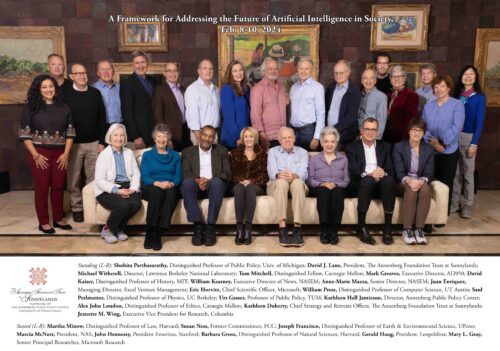 The two-stage retreat generated the editorial “Protecting scientific integrity in an age of generative AI,” published May 21, 2024, in the Proceedings of the National Academy of Sciences (PNAS), in which an interdisciplinary group of experts urged the scientific community to follow five principles of human accountability and responsibility when using AI in research.
The two-stage retreat generated the editorial “Protecting scientific integrity in an age of generative AI,” published May 21, 2024, in the Proceedings of the National Academy of Sciences (PNAS), in which an interdisciplinary group of experts urged the scientific community to follow five principles of human accountability and responsibility when using AI in research.
Papers commissioned for the retreat that explored various aspects of AI and its use and governance were digested in the journal Issues of Science and Technology. The papers will form the basis of a forthcoming book to be published by the University of Pennsylvania Press.
Participants at the retreat included Nobel laureates David Baltimore, Saul Perlmutter, and Harold Varmus; 12 members of the National Academy of Sciences or the National Academy of Engineering, or both; the presidents of the U.S. and German National Academies of Sciences, respectively, Marcia McNutt and Gerald Haug; Microsoft’s chief scientific officer, Eric Horvitz; Vinton Cerf, the chief internet evangelist at Google, who is widely considered one of the fathers of the internet; and Susan Ness, a former FCC commissioner, APPC distinguished fellow, and former head of the Transatlantic Working Group.
The Annenberg Foundation Trust at Sunnylands president David Lane discusses the retreat on AI in his 2024 Annual Letter. Read it here.
Realizing the Promise & Minimizing the Perils of AI for the Scientific Community (November 2024)
In a follow-up to the 2023-24 retreats, the National Academy of Sciences, Sunnylands, and the Annenberg Public Policy Center convened a virtual retreat on Nov. 13, 2024, to discuss possible structures, functions, and goals of a Strategic Council on the Responsible Use of Artificial Intelligence in Science, as proposed in the PNAS editorial that emerged from the earlier retreat. The group proposed that the NASEM establish the council to “coordinate with the scientific community and provide regularly updated guidance on the appropriate uses of AI, especially during this time of rapid change.” The group also discussed dissemination plans for the essay collection that emerged from the prior meetings, “Realizing the Promise and Minimizing the Perils of AI for Science and the Scientific Community,” published in November 2024 in paperback and as a free, downloadable eBook by the University of Pennsylvania Press.
Participants in the retreat included Nobel laureate Saul Perlmutter, professor of physics at University of California, Berkeley; Marcia McNutt, then president of the National Academy of Sciences; Eric Horvitz, chief scientific officer of Microsoft; and Michael Witherell, director of the Lawrence Berkeley National Laboratory.
The organizers subsequently determined that mounting such a new initiative was not a viable option at the present time but expressed the hope that it might be possible “to revive this worthy effort at some time in the future.”
Ethical Principles and Scientific Practice
Articulating the Ethical Principles That Should Guide Scientific Practice (November 2017)
In November 2017, the National Academy of Sciences (NAS) and National Academy of Medicine (NAM) co-convened a retreat in partnership with The Annenberg Foundation Trust at Sunnylands and the Annenberg Public Policy Center to formulate the principles that should guide scientists working at the frontiers of the biological sciences. The gathering explored ways for scientific research and innovation to take justice into account to help remedy inequities. The retreat overview was presented by NAS President McNutt, NAM President Victor Dzau, and Sunnylands President David Lane. Among the retreat participants were medical ethics and genetic editing experts, including Jennifer Doudna of the University of California, Berkeley, one of the creators of the CRISPR-Cas9 gene-editing technique. This convening paved the way for a follow-up 2018 retreat that drafted a statement for release by the scientific community at the Second International Summit on Human Genome Editing in Hong Kong.
Ethics and Human Genome Editing (October 2018)
In advance of the Second International Summit on Human Genome Editing, that October 2018 retreat gathered representatives of the major national academies of sciences from around the globe to draft ethical principles to guide research in this area. The development of CRISPR tools for human genome editing had heightened awareness of the risks and consequences of research in this domain.
At the Annenberg Community Beach House, in Santa Monica, Calif., the scientists crafted a consensus statement establishing processes and ethical principles to guide the use of human genome editing and related research to ensure that it would be used to mitigate human diseases and protect future generations against negative consequences. Central parts of that statement were incorporated into the Hong Kong Summit’s final document.
Third International Human Genome Editing Pre-Summit (October 2021)
In advance of the Third International Summit on Human Genome Editing, this virtual pre-summit was sponsored by the National Academies, Sunnylands, and APPC as a retreat for the organizing committee to finalize summit sessions and discuss development of a joint statement. Among the retreatants were Nobel laureates Jennifer Doudna of the University of California, Berkeley, who did pioneering work on CRISPR gene editing, and the researcher and virologist David Baltimore of the California Institute of Technology, who has contributed widely to the understanding of cancer, AIDS, and the molecular basis of the human body’s immune response, as well as Robin Lovell-Badge, head of the laboratory of stem cell biology and development genetics at the Francis Crick Institute. The Third International Summit, which was to have taken place in March 2022, was postponed but subsequently conducted in March 2023 at the Francis Crick Institute, in London, where experts gathered to discuss the development of CRISPR-based medicines for treating human diseases as well as the risks, shortcomings, and ethical issues posed by the use of gene-editing. Read the concluding statement of the organizing committee.
Science in the Courts
Safeguarding the Integrity of Science in Briefs for the Courts (February 2019)
Combating the inaccurate use of science in amicus briefs filed with the U.S. Supreme Court and lower courts was the focus of a February 28-March 2, 2019, retreat at Sunnylands titled “Protecting Science in the Courts: Amicus Briefs and the Law.” Convened under the leadership of Nobel laureate David Baltimore and Washington, D.C., Circuit Court Judge David Tatel, the retreat addressed the challenges faced by lawyers and jurists who often have little scientific training but need to evaluate research cited in legal briefs that may include factual assertions that go beyond the scientific record.
The retreat focused on ways to increase the likelihood that the science cited in amicus briefs actually exists and is accurately used, and that the scientific publications cited can be accessed by judges.
As background for the retreat, William & Mary law professor Allison Orr Larsen prepared a memorandum presenting her research that Supreme Court justices are increasingly relying on amicus briefs and using them to support factual claims. Over the five-year period from 2013-2018, she found 277 instances where a justice cited an amicus brief to support a factual claim – 93% of which involved “fact-y” claims that were uncontested by the parties to the litigation and were therefore not subject to traditional reliability checks in the court system. Larsen cited this work in subsequent testimony before the Senate Judiciary Committee and to the Presidential Committee on Supreme Court Reform.
Joe Cecil, a member of the National Academies’ Committee on Science, Technology & Law, presented a white paper with a proposal to curb the problem presented by such “newly-asserted facts” in amicus briefs that have not undergone adversarial examination to evaluate their accuracy and reliability. In the white paper, Cecil proposes an amendment to Rule 37 of the Supreme Court Rules of Procedure that will “highlight new factual assertions in amicus briefs and allow the Supreme Court to make a meaningful assessment of the proper weight, if any, to give such newly-asserted facts.”
Enhancing the Responsiveness of the National Academies’ Reports to the Needs of the Courts (November 2020)
This virtual retreat was a follow-up to the 2019 retreat on safeguarding the integrity of scientific briefs in the courts. The retreat brought together experts in the law and science, including U.S. circuit court judges Diane P. Wood, chief judge of the U.S. Court of Appeals for the Seventh Circuit, and David S. Tatel, of the U.S. Court of Appeals for the District of Columbia, and the Nobel laureate David Baltimore, of the California Institute of Technology. The participants considered a series of case studies involving Academy reports, including reports bearing on eyewitness identification testimony, genetically engineered crops, and the economic benefits and costs of immigration.
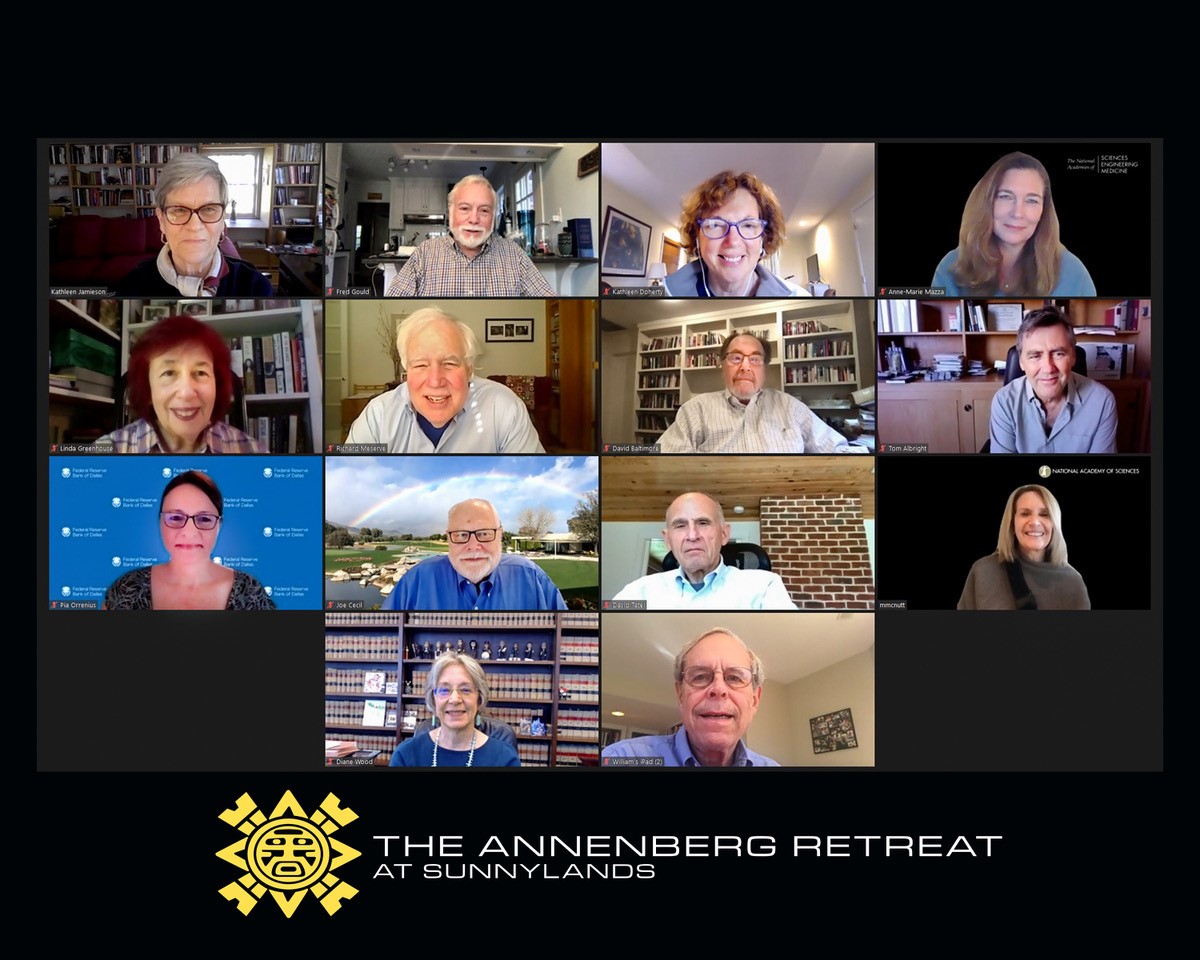
The preface to the fourth edition (2025) of the Federal Judicial Center’s “Reference Manual on Scientific Evidence,” published by the National Academies Press, credits the 2019 and 2020 retreats as having “identified many topics and issues that appear in this new edition of the manual.”
This post was updated in January 2026.
